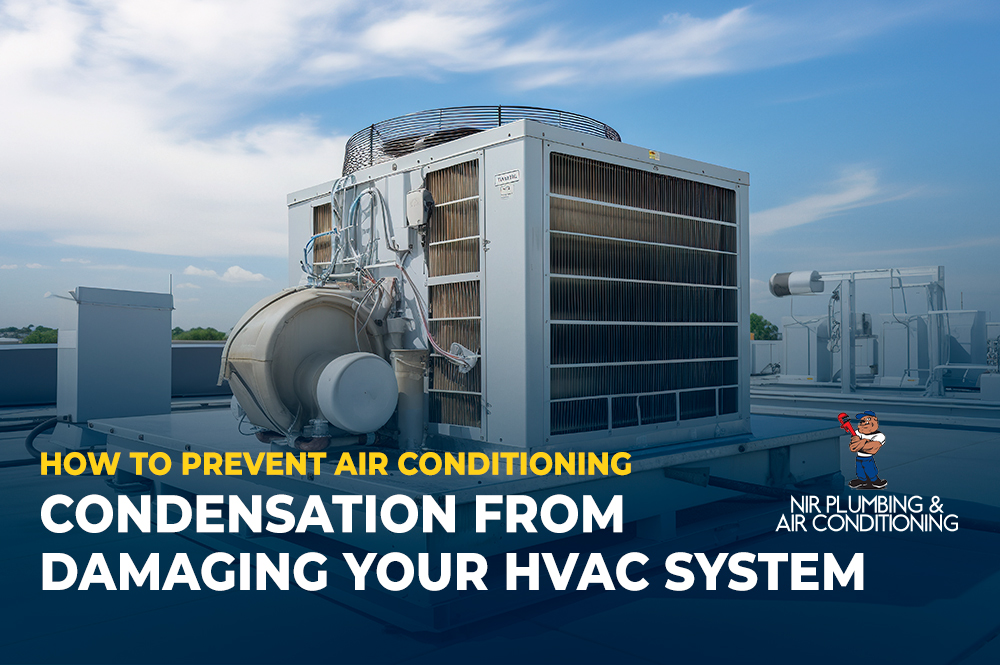Overview: Don’t let the heat take its toll on you! You can learn effective strategies to prevent air conditioning condensation damage and safeguard your HVAC system. Protect your investment and enjoy a comfortable indoor environment by following our advice!
After months of summer weather, your air conditioning system has probably gotten quite a workout. Without a doubt, air conditioning systems play a crucial role in maintaining comfortable indoor environments, especially during hot summer months. However, they are prone to a common issue called condensation, which can lead to significant damage if not addressed promptly.
Condensation occurs when warm air comes into contact with a cool surface, causing moisture to form. This excess moisture can cause mold growth, corrosion, and other problems that can compromise the efficiency and lifespan of your HVAC system.
In this blog post, we will discuss effective strategies to prevent air conditioning condensation and protect your HVAC system.
Ensure Proper Insulation and Sealing
One of the primary reasons for condensation issues is air leakage around the air conditioning unit or ductwork. Check for any gaps, cracks, or poorly sealed connections in your ducts and insulation.
Properly insulate the ducts to prevent temperature differentials and minimize condensation formation. Additionally, seal any openings around your HVAC system to prevent warm air infiltration and moisture accumulation.
Clean and Maintain Drainage Systems:
Air conditioners have drainage systems designed to remove condensation. Over time, these drains can become clogged with debris, dust, or algae, leading to blockages and water backup. Regularly clean and inspect the drain lines, pans, and traps to ensure they are free of any obstructions.
Consider using a mixture of bleach and water to flush out the drain lines and prevent algae growth. If you notice any issues with drainage, contact a professional HVAC technician for assistance.
>> Related Reading: Ways to Maintain a Healthy Drainage System
Use a Condensate Pump
In situations where it’s not feasible to have a gravity-based drainage system, such as when the air conditioning unit is installed in a basement or below-grade area, consider using a condensate pump.
These pumps are designed to collect and remove condensate to a proper drainage point. They can effectively prevent water accumulation and reduce the risk of damage to your HVAC system.
Interested in learning more about the condensate pump? Here’s a guide on What Is A Condensate Pump & Why Do I Need One?
Employ a Dehumidifier
High humidity levels also contribute to increased condensation within your HVAC system. Using a dehumidifier can help reduce moisture in the air, minimizing the chances of condensation formation.
Place the dehumidifier in areas with high humidity, such as basements or areas with poor ventilation. Make sure to monitor, maintain, and clean the dehumidifier regularly to ensure optimal performance.
Schedule Regular HVAC Maintenance
Regular HVAC maintenance is essential to keep your system in top condition and identify potential issues early on. During routine maintenance, an HVAC professional can inspect your system for any signs of condensation or moisture-related problems.
They will also clean and service the components, ensuring optimal performance and efficiency.
Improve Ventilation
Proper ventilation is vital to control moisture levels within your home. Ensure that the areas where moisture is more likely to accumulate, such as bathrooms, kitchens, and laundry rooms, have adequate ventilation.
One affordable and do-it-yourself way is to install exhaust fans or open windows when engaging in activities that generate excess moisture, like showering or cooking. Good ventilation helps to remove humid air and prevent it from interacting with cool surfaces.
Seek Professional Assistance
If you’re unsure about how to prevent or address condensation issues, don’t hesitate to seek professional assistance. HVAC technicians have the expertise to assess your system, identify potential problem areas, and provide tailored solutions. Their guidance can help you implement the most effective strategies to prevent condensation and protect your HVAC system.
>>> Learn More: How Does Natural Ventilation Reduce Humidity?
In Summary
Preventing air conditioning condensation is crucial to maintaining the efficiency and longevity of your HVAC system. By following these preventive measures, you can minimize the risk of condensation-related issues such as mold growth, corrosion, and water damage.
Remember to regularly inspect, clean, and maintain your HVAC system, and consult with a professional HVAC technician for any concerns. With proper care, you can ensure that your air conditioning system operates optimally while keeping your indoor environment comfortable and healthy.


